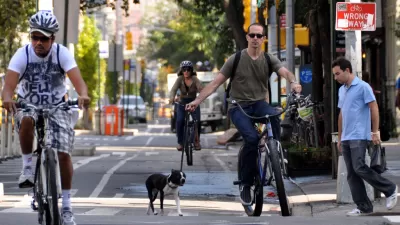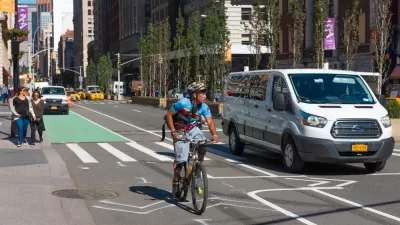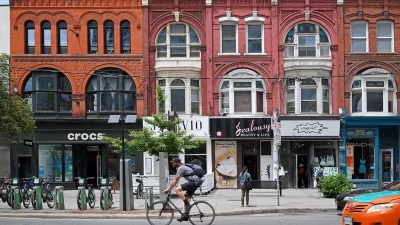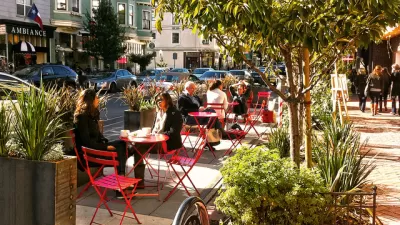The Regional Plan Association is calling on New York City to implement an ambitious plan to transform the city into a world class city for biking—for the benefit of the public health and economic realities of the pandemic and beyond.

The Regional Plan Association (RPA) released a plan for a Five Borough Bikeway this week, calling for a revolution in the management and use of streets in the city of New York.
"We need to develop a network of priority, high-capacity, protected bike lanes that serve as the heart of a comprehensive and cohesive bicycle network," according to the RPA.
The report commences from a discussion about the quiet of city streets during the stay-at-home orders of the pandemic and the emergence of the bicycle as a preferred method of transportation during the trouble early months of the crisis.
As work and travel restrictions are gradually lifted, NYC’s infrastructure will need to handle growing numbers of travelers in ways that ensure more space per person. There is also a wide consensus on the need for additional federal support for infrastructure spending to stimulate economic activity and development. One of the best ways to get NYC up and moving again quickly, and with peace of mind, would be through the proliferation of bike lanes that are laid out in this report.
The plan lays out a phased implementation plan, which would start with planters and bollards before laying the long-term cornerstones of a strategy to reduce greenhouse gas emissions in the city. The entire Five Borough Bikeway would span 425 miles of continuous, protected bike infrastructure.
The Five Borough Bikeway Plan is available in its entirety on the RPA's website.
FULL STORY: The Five Borough Bikeway

Planetizen Federal Action Tracker
A weekly monitor of how Trump’s orders and actions are impacting planners and planning in America.

Map: Where Senate Republicans Want to Sell Your Public Lands
For public land advocates, the Senate Republicans’ proposal to sell millions of acres of public land in the West is “the biggest fight of their careers.”

Restaurant Patios Were a Pandemic Win — Why Were They so Hard to Keep?
Social distancing requirements and changes in travel patterns prompted cities to pilot new uses for street and sidewalk space. Then it got complicated.

Platform Pilsner: Vancouver Transit Agency Releases... a Beer?
TransLink will receive a portion of every sale of the four-pack.

Toronto Weighs Cheaper Transit, Parking Hikes for Major Events
Special event rates would take effect during large festivals, sports games and concerts to ‘discourage driving, manage congestion and free up space for transit.”

Berlin to Consider Car-Free Zone Larger Than Manhattan
The area bound by the 22-mile Ringbahn would still allow 12 uses of a private automobile per year per person, and several other exemptions.
Urban Design for Planners 1: Software Tools
This six-course series explores essential urban design concepts using open source software and equips planners with the tools they need to participate fully in the urban design process.
Planning for Universal Design
Learn the tools for implementing Universal Design in planning regulations.
Heyer Gruel & Associates PA
JM Goldson LLC
Custer County Colorado
City of Camden Redevelopment Agency
City of Astoria
Transportation Research & Education Center (TREC) at Portland State University
Camden Redevelopment Agency
City of Claremont
Municipality of Princeton (NJ)





























